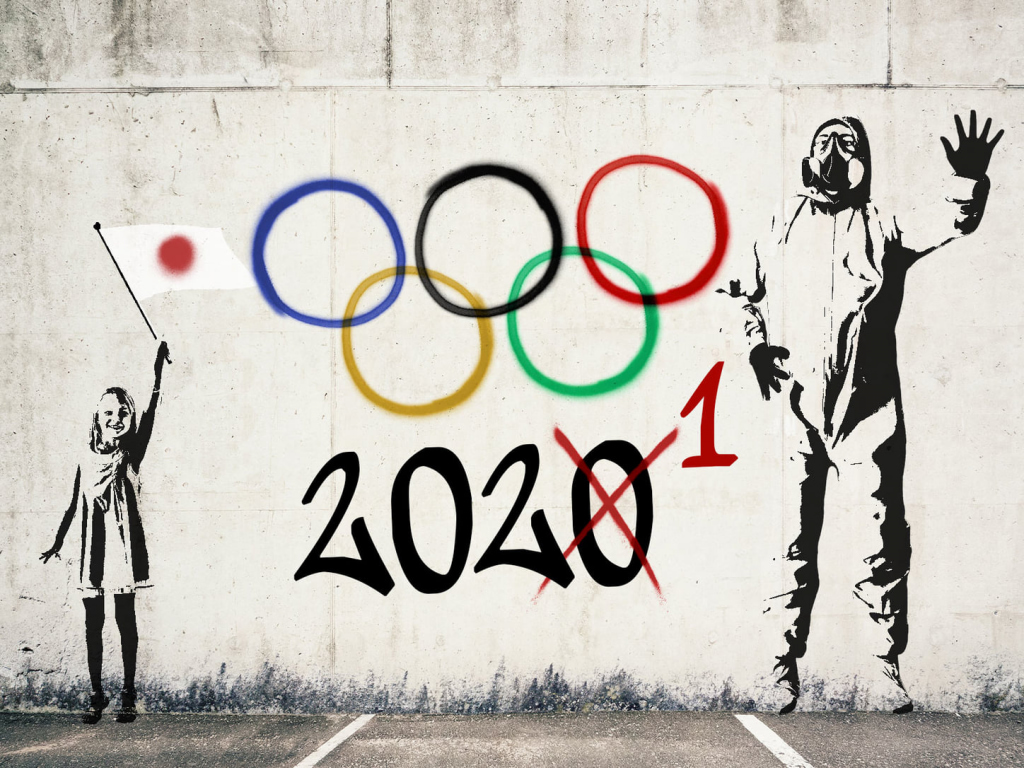The Tokyo Olympics certainly made history in 2020, but not in the fashion Japan would have hoped. After a baffling period of “will they, won’t they,” the International Olympic Committee (IOC), in accordance with Prime Minister, Shinzo Abe, made the unprecedented decision to postpone the Games until summer 2021 due to the outbreak of the novel coronavirus.
The Games were scheduled to launch today with a grand opening ceremony at the brand new National Stadium, and the thought of the quadrennial sporting showcase taking place this summer – and 10 million visitors from across the globe landing in Japan for the pleasure – seems about as rational as praying for another pandemic.
Covid-19 still runs amok in some of the world’s largest populations, like Brazil, the US and India, while Tokyo’s case numbers recently witnessed a record-breaking uptick. Meanwhile, vaccines are in development, but the belief they’ll be on the mass market soon is naught but a pernicious fairytale. Testing methods are becoming more widespread, yet few are 100% reliable. More than 100 countries are still covered under Japan’s travel bans. And in scientific circles, debates still rage over how exactly the virus spreads.
The opening ceremony is now slated for July 23, 2021 (though the competition will kick off with softball on July 21 – see full schedule here), with the Games running through August 8, effectively one full calendar year later than the original dates.
Tokyo Olympics head: 2021 Games not possible under current coronavirus conditions https://t.co/RB4qoWKhPl
— TIME (@TIME) July 22, 2020
One Year to Go: Shifting the Dates to 2021
On the official Tokyo 2020 website, a statement from Governor Koike reads, “In consideration of the global coronavirus outbreak, we need a certain timeframe before we fully prepare for the delivery of Games that are safe and secure for the athletes and spectators… The dates match with the same timeframe as the original competition dates, corresponding with ticketing, venue staffing, volunteers and transport. Therefore, I believe that celebrating the opening of the Olympic Games Tokyo 2020 on 23 July 2021 is ideal.”
“Where common sense has prevailed in some quarters, it’s been absent in others.”
In some aspects, the timeframe makes sense. Athletes and national sporting bodies need to dedicate themselves to qualification, training and preparation, which were far from complete when the pandemic brought proceedings to a halt. All previously qualified athletes, and those who have already fulfilled quota places for Tokyo 2020, will remain so for 2021. However, only around 57% of the quota places have been allocated, leaving approximately 5,000 up for grabs.
The new qualification deadline has also been moved to June 29, 2021. While the IOC Qualification Task Force aims to prioritize the original qualification system for each sport, in cases where it’s dependent on world rankings, international sporting federations have full discretion. This is to ensure athletes who were on the brink of qualification in 2020 and those excelling in 2021 have the opportunity to compete in July next year.
Exceptions will also be made for athletes no longer eligible due to age restrictions. For example, the men’s football tournament is based on age criteria (Under 23). Players who were eligible for the 2020 Games will still be able to lace up their boots next year, even if they have since surpassed the threshold.
The Olympics in Tokyo may have to be postponed again if the coronavirus mutates into a stronger pathogen, a prominent Japanese government adviser said https://t.co/xzstaQl54S
— Reuters (@Reuters) July 15, 2020
Rescheduling Woes for Tokyo 2021
But where common sense has prevailed in some quarters, it’s been absent in others. The Olympic organizing bodies, of which there is a bureaucratic boatload, were already criticized for agreeing to stage the Games during Japan’s stifling midsummer. So much so, that last November a decision was made to shift the long-distance running and speed walking events to the milder climes of Hokkaido, 500 miles to the north. The postponement provided a gaping opportunity to right the scheduling wrongs by moving the Games back to autumn – just as the 1964 Tokyo Olympics took place in October.
Equally worrying, is that one year until liftoff, we still don’t know what the shape of the post-pandemic world will be (or even if the “post” prefix will be applicable). If no vaccine is available, the Tokyo Olympics – which originally expected 11,000 athletes, 7,000 officials, 25,000 media representatives, 80,000 volunteers, 900,000 daily spectators – could play out in a viral minefield. Mandatory testing for coaches and athletes, creating a Covid-19-free bubble in the Olympic Village and training camps, is expected. But it’s only the beginning.
IOC's Dick Pound against locals-only crowds for Tokyo Olympics https://t.co/NxoxXGfHzZ
— Japan Times: Sports (@jt_sports) July 21, 2020
One Year To Go: The New-Look Olympics
IOC President, Thomas Bach, stated that postponing the Games again isn’t an option; if they can’t go ahead in July 2021, they’ll be in infamous company with the canceled Olympics of 1916, 1940 and 1944, all receiving the guillotine due to the outbreak of world wars.
To mitigate against this, the Tokyo 2020 Organizing Committee set forth plans to simplify the Olympics in 2021. This could include reduced numbers of spectators at events and holding the opening and closing ceremonies and torch relay on a smaller scale. Final decisions won’t be made until spring next year.
“Will we see the inaugural Olympic immunity passports?”
Questions also remain over how to allow for social distancing among spectators: Who loses out? Will everyone be tested? Will we see the inaugural Olympic immunity passports? How about if an athlete tests positive for Covid-19? Are they – and all those who’ve come into contact with them – automatically disqualified? And surely if a nation is still ravaged by the virus, athletes therein will face problems resulting from global travel bans.
Tokyo 2020 spokesman, Masa Takaya, told reporters in early June that coronavirus countermeasure discussions would be held “from this autumn onwards.” Until then, we can only really speculate. But if Covid-19 still poses a threat, the likelihood of a full-scale Olympics in Tokyo next year is effectively nil.
📸For TV & Photographers
Some venues will be lit up tomorrow to pay tribute to medical workers & to support athletes preparing for #Tokyo2020
– Tokyo Metropolitan Gymnasium
– Ariake Arena
– Aquatics Centre
– Ajinomoto Stadium
– Komazawa Olympic Park
– TMG
– SkyTree#1YearToGo pic.twitter.com/UaWaNAAdOI— Tristan (@trilavier) July 22, 2020
Beyond the Track
The Olympics’ postponement delivered a haymaker on the jowl of the Japanese economy – a $300 billion boost was expected; an upturn unseen since the days of the late-20th-century runaway bubble. Now there is a new common denominator among the predictions: the postponement will be pricey.
Official estimates for the expenditure on Tokyo 2020 was around ¥32 trillion, of which ¥20 trillion would be lost in the event of a cancellation. The postponement could add ¥300 billion onto the bill, with the IOC expecting to bear costs of up to $800 million (¥85 billion). While lucrative sponsorship grants from major corporations – including developers of the Olympic robots, Toyota – only run until 2020.
Disruptions caused by Covid-19 have put Japan in damage limitation mode, when Tokyo 2020 should’ve presented the perfect opportunity to springboard off the success of last year’s Rugby World Cup. Irrespective of what shape the Games take in summer 2021, one can’t help but wonder what could have been.









